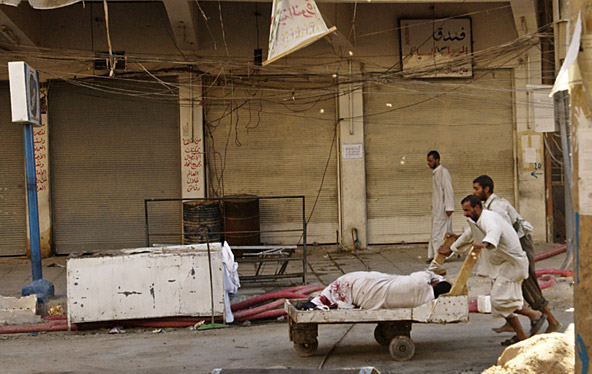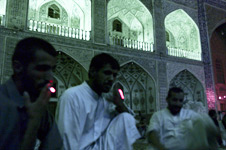
Najaf, Iraq, 17 August 2004. A fighter wounded by U.S. forces at the bottom of Rasul street is carried back to the makeshift hospital in the shrine. Many of the dead came up Rasul street on carts throughout the siege.
Photo: Thorne Anderson, Corbis.
On August 16, Thorne Anderson knocked on the door of room twenty-five. We were restless and sick of being holed up in the hotel. Thorne closed the door behind him and said, "What do you want to do?"
"I think we should go to Najaf."
"How are we going to get in, if we get close enough?"
"There's a safe passage letter from Sheikh Ahmed Sheibani I've been showing around."
Thorne thought about it and said he wanted to go. We decided to leave the next morning.
We didn't tell anyone about our plans to try to cross the siege lines. Other friends dropped by and asked what we were going to do but we kept it an absolute secret. Kael Alford was already in Najaf, moving around the front lines near the old city but she was unable to enter because her group was drawing fire. In the morning, we hired a translator named Basim and a driver to take us to Najaf and they were not happy about the trip. Basim said, "Phillip, I really think we should tell Fatah where we're going."
"No fucking way." I said. Fatah had threatened the translator, demanding reports on us.
"I think we are all going to die," Basim said in his strange high-pitched voice.
"Stop panicking, Basim."
We drove through the southern suburbs of Baghdad, past the black smoke plume of the Doura power station. When Basim finally spoke again, he said, "Phillip, Iraq is like a universe without a god. There are no laws, the result is complete chaos."
In Kufa, a few kilometers from Najaf, a fighter motioned with his Kalashnikov for us to get out of the car. A cleric took us to the mosque, gave us water, and invited us to lunch. They treated us well, and we stuck around in a commander's office for the rest of the afternoon, thinking we might be able to find out about an underground railroad to the shrine, starting at the mosque in Kufa. The commander watched us. We waited in his office for four hours, begged for his help. He said he was sorry, but he couldn't help us. Thorne sat on the floor and made conversation with the commander. We dozed until a fighter came running in to show us a captured American anti-tank weapon. The missile had been fired, but he was proud, he wanted to show us the empty casing. We admired it. Then the fighter showed us his Strela anti-aircraft missile launcher with the missile still in it. He'd come from the old city.
A stream of men arrived with donated food supplies that the commander received graciously and entered into a giant ledger before locking them away. I remember that an old man walked in and told us that he had come from the old city. This was the first break. A few minutes later, an assistant to the Mahdi Army commander of the Kufa mosque offered to take us across the lines. The assistant's name was Talib. He was a thin serious man in his late-thirties, a laborer who had fought against Saddam in the nineties, he seemed honest and straightforward.
Late in the afternoon, as the sun was going down, we took Talib, our Mahdi guide, with us and drove toward Najaf, winding our way through the dust-choked southern suburbs, only stopping when Bradleys were too close or tanks appeared around corners. At the edge of the city, we got out of the car and listened to the deafening explosions coming from town. Pressure waves hit us in the chest. It was impossible to go forward because of the fighting on the routes into the city. Basim and the driver were panicking, and we slowly retraced our route out of town. Talib told us to stay in a hotel in Kufa run by his friends and said we'd try again the next morning. Talib would come for us at seven, when the bombing was less intense. It was like waiting for a break in the weather. "Don't go outside, don't let anyone see you," he said as we unpacked the gear. A few minutes later, Basim and our driver told us they were driving back to Baghdad without us, "You will die, one hundred percent. If you go in, you won't come out."
"Basim, aren't you a little panicked?" I asked.
"Absolutely not."
Thorne told him to take it easy, but there was no talking to him. Basim was convinced of his own death.
By eight o'clock that night we were stranded in Kufa without a driver or a translator. We ate a meal of shawarma sandwiches and stayed away from the windows.
On the roof of the Kufa hotel, Thorne put in a satellite call to Mitch Prothero, another journalist at the Dulaime, and told him we were stuck. Mitch said he would send a translator down for us and to expect him in the morning. We expected nothing. At six- thirty, Yassir opened the door of our room and found us after we'd stayed up all night listening to gunfire outside the hotel. Yassir was ready to go.
We took a cab to the edge of Najaf, retracing the route of the previous day. In the dusty suburbs of the city we got out to walk three miles to the shrine. Yassir, calm and steady, walked right next to us. We thought there wouldn't be much fighting in the early morning but there was a great deal of it. Tympanum sounds. Tearing noises that went beyond mere machinery. It was the sound of a battle between heaven and hell. I tasted copper in my mouth as we walked. Clouds of dust rose over the warren of houses in the old city. We heard fifty-caliber machine guns, rocket-propelled grenades, and hellfire missiles fired from attack helicopters. We made our way slowly toward the American lines at Medina Street, following a trickle of old men and women. We walked north, talking to passing Najafis who warned us away from snipers. One middle-aged man offered us water and sanctuary. Men stood outside their houses with their sons listening to the war. A crowd followed us and then disappeared. We continued. Talib told us that if the Iraqi police caught us going into Najaf, they would shoot us. They were worse than the Mahdi Army he said.
 LEAD IMAGE: 17 August 2004, Najaf, Iraq. Young followers of Moqtada al Sadr inside the shrine of Imam Ali during the siege.
LEAD IMAGE: 17 August 2004, Najaf, Iraq. Young followers of Moqtada al Sadr inside the shrine of Imam Ali during the siege.Photo: Thorne Anderson
© Phillip Robertson, 2009-2020.
